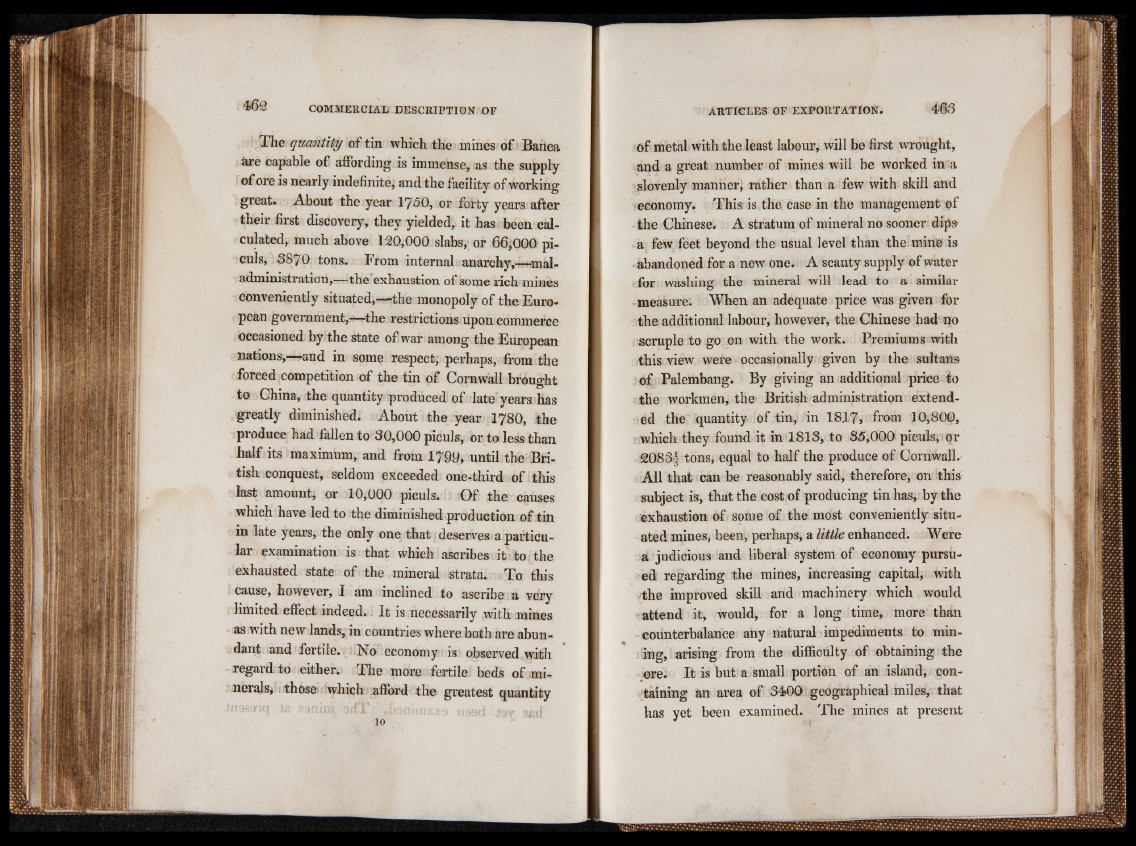
The quantity of tin which the mines of Banca
are capable of affording is immense, as the supply
of ore is nearly indefinite, and the facility of working
great. About the year 1750, or forty years after
their first discovery, they yielded, it has been calculated,
much above 120,000 slabs, or 06,000 piculs,
3870 tons. From internal anarchy,—maladministration,—
the exhaustion of some rich mines
conveniently situated,—the monopoly of the European
government,—the restrictions upon commerce
occasioned by the state of war among the European
nations,—-and in some respect, perhaps, from the
forced competition of the tin of Cornwall brought
to China, the quantity produced of late years has
greatly diminished. About the year 1780, the
produce had fallen to 30,000 piculs, or to less than
half its maximum, and from 1799, until the British
conquest, seldom exceeded one-third of this
last amount, or 10,000 piculs. Of the causes
which have led to the diminished production of tin
in late years, the only one that deserves a particular
examination is that which ascribes it to the
exhausted state of the mineral strata. To this
cause, however, I am inclined to ascribe a very
limited effect indeed. It is necessarily with mines
as with new lands, in countries where both are abundant
and fertile. No economy is observed with
regard to either. The more fertile beds of minerals*
those which afford the greatest quantity
Of metal with the least labour, will be first wrought,
and a great number of mines will be worked in a
slovenly manner, rather than a few with skill and
economy. This is the case in the management of
the Chinese. A stratum of mineral no sooner dips'
a few feet beyond the usual level than the mine is
abandoned for a new one. A scanty supply of water
for washing the mineral will lead to a similar
measure. When an adequate price was given for
the additional labour, however, the Chinese had no
scruple to go on with the work. Premiums with
this view were occasionally given by the sultans
of Palembang. By giving an additional price to
the workmen* the British administration extended
the quantity of tin, in 1817, from 10,800,
which they found it in 1813, to 35,000 piculs, or
2083 | tons, equal to half the produce of Cornwall.
All that can be reasonably said, therefore, on this:
subject is, that the cost of producing tin has, by the
exhaustion of some of the most conveniently situated
mines, been, perhaps, a little enhanced. Were
a judicious and liberal system of economy pursued
regarding the mines, increasing capital, with
the improved skill and machinery which would
attend it, would, for a long time, more than
counterbalance any natural impediments to mining,
arising from the difficulty of obtaining the
ore; It is but a small portion of an island, containing
an area of 3400 geographical miles, that
has yet been examined. The mines at present